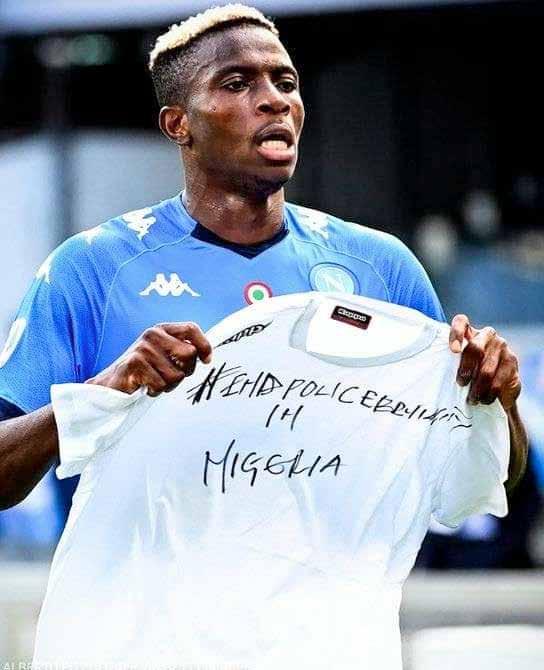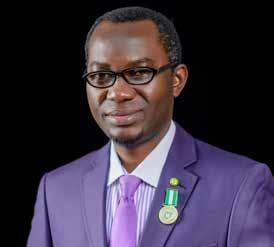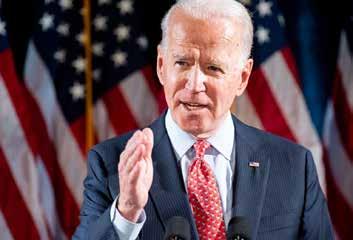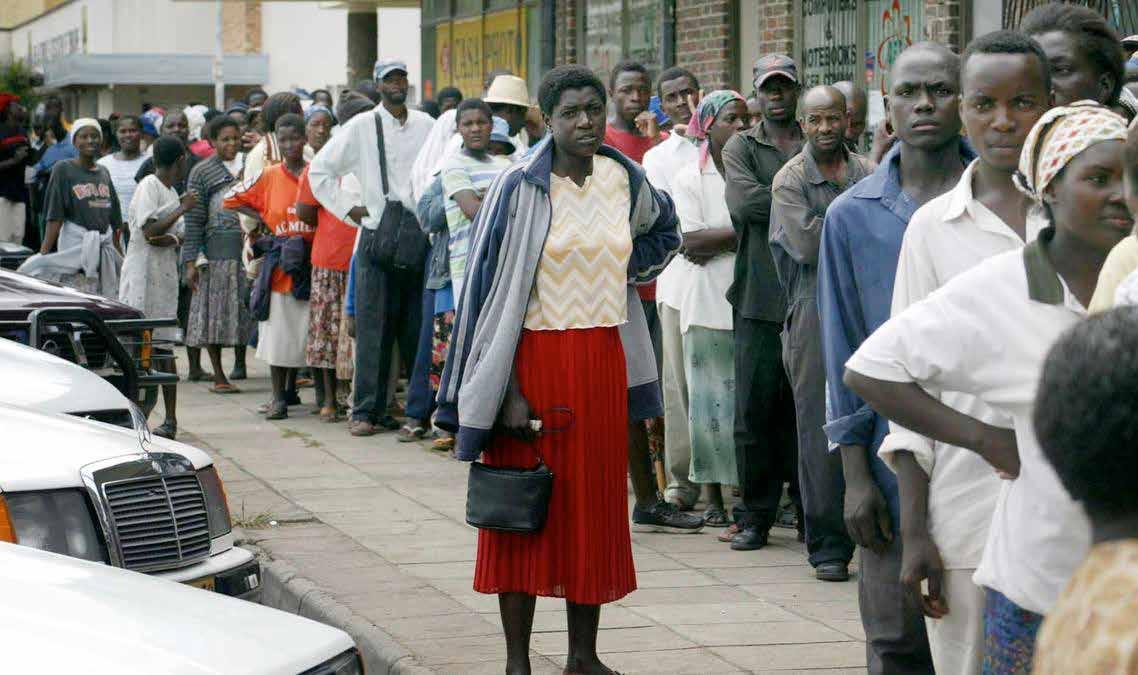
66 minute read
Congratulations to Madam Yai Fatou Secka at 50


Advertisement

5th October 2020, Madam Fatou turned 50. Her husband, children, grand children, families and friends celebrated her across the world. They surprised her with a birthday party in London, United Kingdom. Madam Fatou was for several years The Voice magazine coordinator in The Gambia; she ran our office there with a team before she moved to the United Kingdom. We remember your service to this magazine and we celebrate your life at 50. We pray for good health for you in years to come. Thank you for your service to The Voice magazine TV Management.



Uganda’s ‘taxi divas’ rise from COVID-19’s economic gloom
By RODNEY MUHUMUZA Associated Press
Uganda’s latest ride-hailing service, called
Diva Taxi, is breaking the mold in the socially conservative country by hiring only female drivers
KAMPALA, Uganda - The women grappled with each other inside the vehicle. The driver jerked to ease the grip around her neck, then turned to elbow her attacker in the back seat. She flung the door open to make her escape, ending the simulated attack. “This one is too strong for me,” the attacker said, smiling and shaking her head. Then it was another woman’s turn in the exercise to prepare drivers for Uganda’s new all-female ride-hailing service, Diva Taxi. The taxi service, dreamed up by a local woman who lost her logistics job at the start of the coronavirus outbreak, was launched in June and has recruited over 70 drivers.

They range from college students to mothers hoping to make good use of their secondhand Toyotas. “It started off as a joke, supported by close friends and family, but eventually the idea picked up,” said company spokeswoman Rebecca Makyeli. “They said, ‘Why not? As ladies, you know we can no longer slay on Instagram on the outside, so why don’t we slay as divas with a cause.’ So we called it Diva Taxi.”
It’s uncommon to find women taxi drivers in Uganda, a socially conservative East African country where most women labor on farms or pursue work in the informal sector.
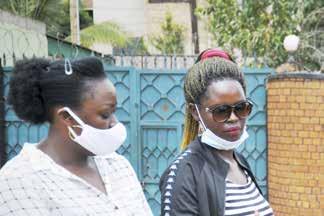
Diva Taxi believes countless women are looking for job opportunities at a time of severe economic distress. The International Labor Organization has said women’s employment in developing countries is likely to be hit harder than men’s in the pandemic. “I should say I was personally affected by COVID,” Diva Taxi founder Gillian Kobusingye said. A regular traveler, she found herself grounded indefinitely as authorities imposed restrictions on movement to slow the spread of the virus. For several weeks, even taxis were not authorized to operate in Uganda. Still, Kobusingye felt optimistic. “Despite whatever circumstance in the world, there will be need of something to reach somebody ... And how does that happen? Through transport,” she said. She believed that a woman seeking to become a driver was likely to want the opportunity more than any man. And she backed women to be more reliable.
“Our ladies are extremely hardworking, very motivated, and I like their sense of pride when they do this work,” she said. “They do it with one heart compared to other people, and that’s the difference we have with our competitors.” Some clients, who include men, agree. “The divas are always on time,” said Kampala-based auditor Jemimah Bamwebaze, a regular user. She also feels safer “being driven by a fellow woman.” A prospective driver must have a car in good condition and a smartphone equipped with the mobile app that clients use, along with a valid driver’s license and a certificate of good conduct issued by Interpol. With Diva Taxi, 85% of proceeds from a trip go to the driver, strikingly low in Uganda but part of a plan to size up the market, Makyeli said.
Driver Donna Ochen, a FedEx accountant furloughed in March who looks after three children, said she had been “doing nothing” at home when she saw a Diva Taxi employee on television discussing opportunities for women. With the consent of her skeptical husband, she contacted the company and was recruited.
“I decided to take it up because it would be an opportunity for me to serve and earn and support my family,” Ochen said. And “it would empower me to do something for myself rather than sitting.” Another driver, college student Tracy Abola, said her mother, a teacher, had been out of work since schools were shut down in March. Abola had been driving a 1998 Toyota “to keep up appearances with friends” until she learned she could make money with Diva Taxi.

“So I decided to do something so that I can also help a bit at home,” she said. The Diva Taxi app has been downloaded at least 500 times, and each of the company’s 72 drivers makes an average of 30 rides each week, Makyeli said. The company expects to have 2,000 active users by the end of this year, a modest target in a city of over 3 million people where taxis and passenger motorcycles are the main means of transport for the working class.
Despite the security training — each driver also receives a canister of pepper spray — safety remains a concern. Ochen said she drives only during the day “to avoid being caught up in any tricky situations,” including with drunken groups. Even as she hopes to return to her job as an accountant, she plans to remain a Diva Taxi driver for as long as possible. “We love what we are doing and it’s really fun,” said founder Kobusingye, an occasional driver herself. “I can’t wait to partner with every woman out there that’s willing to be part of Diva Taxi.”
Stop tossing used face masks on the street, say Dutch environmental groups
Environmental organizations united in Nederland Schoon teamed up with the Plastic Soup Foundation for a campaign urging Netherlands residents to safely and properly dispose of their face masks. Since the urgent advice to wear face masks in public spaces in the Netherlands, more and more of the disposable variants have ended up as litter on the streets, Helene van Zutphen, director of Nederland Schoon, said to the press. Water management companies previously sounded alarm bells over the increasing amount of masks and gloves being flushed down the toilet, which were likely to cause millions of euros in damage. These face masks are harmful to nature, Van Zutphen stressed. “What many people don’t know is that it often also contains plastic. Sometimes it looks like fabric or paper, but it can still contain plastic, which never decays.” With the associated health risks, passersby are also less likely to pick up a mask they see lying on the street and throw it in a bin. Those who want to pick up this waste are advised to be careful.

“If you want to pick them up, do it with a toothpick or gloves. There’s a small chance you could get infected if you’re not careful,” Van Zutphen said. The environmental organizations worry that this new form of litter will only increase once the face mask advice becomes mandatory.
An online search states that “sleep” is “a condition of body and mind which typically recurs for several hours every night, in which the nervous system is inactive, the eyes closed, the postural muscles relaxed, and consciousness practically suspended.” Any living creature experiences fatigue and exhaustion and then sleep to restore energy. Sleep also helps to keep our mind and body healthy. An average person spends about 33 percent of his or her life sleeping. Sleep helps repair and restore our organs and systems, such as immune systems, muscles, hormones, and vital role memory development. No one can survive without sleep, but when somebody over-sleeps, which is called hypersomnia, it has negative symptoms such as heart disease, diabetes, low energy, memory problems, and increased risk of death. Besides, depression and low economic status are also associated with over-sleeping. The sleeping “giant” of Africa, repeatedly drowsy since the second republic, has struggled to keep up with development and progress tracks. Following a series of corruption, human rights abuses, and impunity, Nigerians who have remained asleep under the guise of self-motivation and deep resilience to succeed with or without government, have suddenly regained consciousness. The last republic constitution was a “cut and paste” arrangement by the ambitious military to sleeping democrats. Oversleeping is just as bad as not sleeping enough, as such persons wake up groggy and sick. However, this sudden consciousness dilemma is farreaching, as Nigerians have woken up to a distasteful reality, which only time can reveal. Nigerians have woken up to a very sick nation. From the clamours from separatist groups and agitators, to the unprecedented level of crime rate and insecurity, the six decades of sleep has birthed a nation on the brink. Virtually all sectors of the economy have remained asleep for far too long. Specifically, with the police originally instituted to protect lives, maintain law and order, now resorting to an instrument of oppression and fear, the Nigerian youths within the past eleven days

By Adewale T Akande,
have woken the sleeping giant. Politically, it is a tragedy for nations with citizens who have fallen into protracted sleep amid the misery, poverty, and gross danger, as in Nigeria today. The effect of overdue sleep has brought pervasive corruption, infrastructural decay, educational decay, and government’s highhandedness, which increases ignorance and poverty in all ramifications. In February this year, I made a research trip to Bangkok, Thailand, on bus drivers´ behaviour management and sustainable transport service. I could not believe my eyes with excellent infrastructures transformation in such a third world nation. Meanwhile, Nigeria keeps on recruiting and “electing” incompetent, selfish, and corrupt leaders and representatives to manage her growing population and enormous resources. The bitter truth is that Nigeria has never gotten either a competent Prime Minister or President with VISION since 1960 up till today. The nation has become a “cash and carry” enterprise for every Jack and Harry. You can check their records of little minds. Some of them are worse than armed robbers. People that cannot give what they do not have except abracadabra! Why are the worst of us ruling the BEST of us while the best is good for us all? Meanwhile, with loud blaring from separatist youth and groups, religious leaders, and well-meaning Nigerians agitating for better governance, October 2020 witnessed the awakening of lazy youths with the hashtag “SOROSOKE”. As stated by Anthony Burgess “laugh and the world laugh with you, snore and you sleep alone”. The most populous nation in Africa has been sleeping alone, with her eyes closed for six decades. The world has seen the rise of new global changers like Singapore, Malaysia, India etc. Nigeria had greater potentials in shaping international relations and resources. Nigeria, a nation projected in 2017 by the UN World Population to overtake America’s population and surpasses the 300 million people mark by 2050 and become the most populous country in the world (CNN-Inside Africa, 2017), has arisen to the consciousness of her manifest potentials. The sleeping nation has just
woken up to feel the barbarian conduct of SARS and bad governance in general. As coined by the Nobel Laurel scholar, Nigeria has been the largest sleeping generation in the last two decades in the world. Hence, a potential world market is sleeping. A country blessed with abundant human and material resources has been examined to be sick and in a deep sleep for sixty-years. Moreover, the nation’s marriage of inconvenience (via amalgamation in 1914) is afflicted with sleep and seems not “fully” ready to think of restructuring to retrace her steps and take her role among the league of nations and republics. Nigeria is an epitome of a nation that has been sleeping with wobbly economic and zero national security for so long. A country sleeping when sunrise is beautiful will never get light to see in the night. When a nation sleeps too much, there will be no time to advance development, rather, armedrobbery, scam, ritualists, tribal and religious conflict, and extreme poverty pervades the polity. A people in love with her bed will not encourage her citizens to wake up and go to school as the level of ignorance has become the status quo of every individual and sector of the country. A prosperous nation is not achieved in drowsiness and wishful thinking. It is borne in the extreme consciousness of the realities of hard work, resilience, and creativity, particularly among the youths. It is time to wake up and change the course of time. It is time to end the constructs of corruption and Nepotism in all sectors of Nigeria. It is
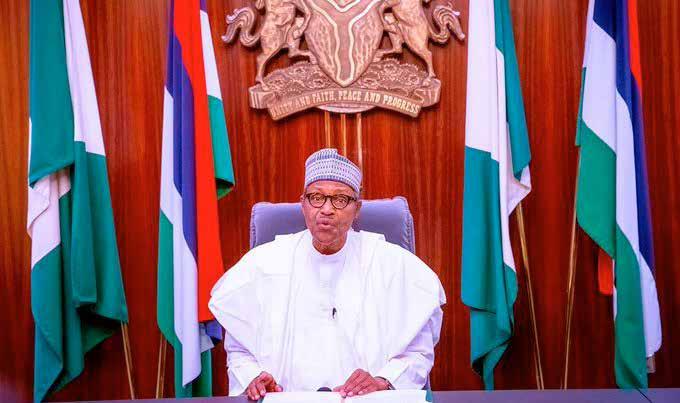

time to breathe fresh air.
Miscreants who have stolen and looted the nation’s commonwealth should be made to face the full weight of the law. This is a clarion call to remain awake by every Nigerian citizen. When everybody sleeps, who will think and act for the nation? It is time to put an end to hatred and all primordial sentiments. It is time to push for critical and innovative thinking that will drive sustainable development. It is time to restructure the country, create jobs and engage best practises for all citizens´ welfare. For we have had more than enough sleep that will last a lifetime, it is time to be fully awake to outs bad governance for a refreshed and rejigged Nigeria.
Written by Adewale T Akande Author, Road Traffic Safety Researcher and Consultant
He is based in Barcelona, Spain. Tel: +34632511469
adewale_akande@hotmail.com
Does protest work? And is it more effective when it takes places in countries ruled by repressive regimes or those with democratically elected governments? Steve Crawshaw writes that if we think nothing will change, as people often do in democracies, that lack of belief becomes self-fulfilling. For much of my life – first as a journalist, and then as a human rights advocate – I have reported on authoritarian regimes and on the often mysterious chemistry of how and when they come and go. I have been fascinated and inspired by change achieved against unthinkable odds – allpowerful rulers overthrown, including through the sometimes startling power of peaceful protest. If so much can be achieved with authoritarian regimes, it would seem that protests in a democratic context should be more effective still. In reality, sometimes the opposite is true. A repressive framework, with nothing but

force to support it, sometimes provides its own kind of instability, hidden in plain sight. Thus, in October 1989, the East German authorities announced a plan to crush peaceful protests in Leipzig, “if need be, with weapons in our hands”. They thought that the pre-announced plans for a massacre meant people would stay at home. But so many people came out that night that the authorities retreated. A month later, as a direct result of that retreat, the Berlin Wall was down.
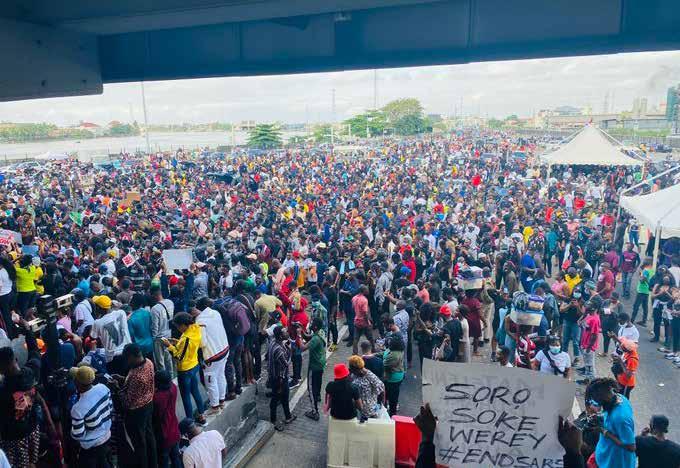
Every unelected dictator suffers, logically enough, from paranoia. You may have all the guns and tanks – but you can still be frightened of what Vaclav Havel, Czech dissident-turned-president, called “the power of the powerless”. In Prague, the repressive apparatus collapsed in barely a week when a quarter of a million went daily on to Wenceslas Square, jangling keys and little bells to tell the rulers: your time is over. In 2011, President Hosni Mubarak was forced to step down when millions of Egyptians demonstrated the power of the powerless, with protests which were peaceful on the protesters’ side, and marked by great violence on the part of the authorities. (The situation in Egypt today is unremittingly bleak; but that takes nothing away from the remarkable achievements of that time.) If it is possible for peaceful crowds to force the collapse of the Berlin Wall or to unseat a Mubarak, how easy it should it be for protesters to persuade a democratically elected leader to retreat from “mere” bad policy? In truth, not easy at all. Two million marched in the UK against the Iraq War in 2003 – and it made not a blind bit of difference with Tony
Blair’s determination to proceed with a war that the UN Secretary-General described as illegal. Blair was reelected, two years later. After the inauguration of Donald Trump in January 2017, millions took part in the series of Women’s Marches in the United States and around the world. It seemed – it was – a powerful defining moment. And yet, at least in the short-term, those remarkable protests were water off the presidential duck’s back. His response was mockery. In some respects, Trump could afford to mock. A man who has received 63 million votes is in a stronger position than the unelected leader who has to threaten or use violence to stay in power. And yet. One thing that protest in an authoritarian and a democratic context have in common is that the impact of protest – including delayed impact – remains uncertain, both for those who protest and those who are protested against. Vaclav Havel argued that it was worth “living in truth” – speaking truth to power – even without any certainty of outcome. “Those that say individuals are not capable of changing anything are only looking for excuses.” In that context, what is perhaps most unacceptable is to mock those who take risks, and seek change. Lord Charles Powell, former adviser to Margaret Thatcher, for example explained

to the umbrella protesters in Hong Kong in 2013 that they were foolish and naive. They should, he told them, learn to live with the “small black cloud” of anti-democratic pressures from Beijing. The protesters failed to heed Powell’s complacent message. In the words of Joshua Wong, on his way back to jail earlier in 2017: “You can lock up our bodies, but not our minds.” Skepticism and failure are linked, as the Egyptian activist Asmaa Mahfouz made clear in a powerful video, which helped trigger the uprising in 2011. The 26-yearold declared: ‘”Whoever says it is not worth it because there will only be a handful or people, I want to tell him, “You are the reason for this.” Sitting at home and just watching us on the news or Facebook leads to our humiliation.’ The video went viral. Millions went out. The rest was history. Even in a democracy, that same it-can’t-be-done logic sucks us in more often, perhaps, than we realize. Ahead of 2017’s UK elections, I was happy to tell whoever would listen that the support of many young people for Jeremy Corbyn was well-meaning but essentially naïve. Too few would support him nationwide. The scale of the Tory victory would be overwhelming. In short: this was an electoral road to nowhere. My analysis (and the identical analysis of others, with much more authority to speak on British politics than I) proved, of course, as accurate as a Trump tweet. So many were so hungry for change that the country’s political landscape changed overnight. In short: voting did what it was supposed to do, in allowing protest to be heard. In this context, the common thread between a surprise election (almost-) defeat for the government and the defeat of an unwanted, unelected regime was above all about belief. From the United States to Hungary, from Poland to the Philippines, where illiberal leaders seem so secure in their hold on power, Havel’s urging of the need to “live in truth” remains as relevant today as it was in the darkest days of the past. In a totalitarian context, you need to gain belief to find the courage to go out on the street, despite all the obvious risks. In a democracy, the decision should be easier. But Asmaa Mahfouz has been proved right, over and over. If we think nothing will change, then that lack of belief becomes selffulfilling: then, indeed, nothing will change.
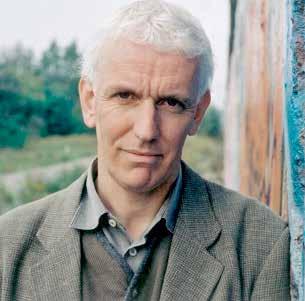
By Steve Crawshaw is an advocacy adviser at Amnesty International, and author of Street Spirit: The Power of Protest and Mischief, foreword by Ai Weiwei.
Dutch King apology to his subjects over Greece holidays with family
King Willem-Alexander and queen Maxima have issued a two-minute video in which they speak of their regrets about going on holiday to Greece last month. The king, Maxima and their youngest daughter returned home from their Greek holiday home after less than a day following a public outcry in the Netherlands about the trip. The two older Princesses returned on two days later. ‘It hurts to have betrayed your trust in us,’ the king said. ‘Even though the trip was in line with the regulations, it was very unwise not to take into account the impact of the new restrictions on our society.’ The royals’ holiday home is in a code yellow zone but last month Prime Minister Mark Rutte had urged everyone to minimize travelling, as part of a new package of measures to reduce the spread of coronavirus. The king did not mention the decision to allow the two older girls to return home several days later. According to the state information service RVD, King Willem-Alexander reads his speech, watched by queen Maxima and Prime Minister, Mark Rutte. Photo: Koen van Weel (ANP) there were no seats left on the plane to bring them back on Saturday with the rest of the family. ‘From the start of the coronavirus crisis, we have done our best… to be there as much as possible for everyone who is looking for support in uncertain times,’ the king said. ‘It is a difficult time for everyone…we have heard the poignant stories in many meetings with you, in person and digitally. We feel connected with you and with all those people who have been directly or indirectly affected.’ The message, recorded at the family home in The Hague, concluded with the king stating: ‘We are part of this. But we are not infallible.’ Prime minister Mark Rutte earlier accepted full responsibility for the trip, saying he had made an error of judgment and apologized too the country but the people still expected the King as Head of State to take personal responsibility which he did with the public apology.


‘We are not infallible,’ king says in video statement about Greek holiday
King, Royal Family arrive in Netherlands after Extoll modelling management catching them young for the future holiday row; Dutch PM takes responsibility
The Dutch Royal Family returned to the Netherlands after cancelling their fall holiday trip to Greece, according to reports from multiple news outlets. They reportedly returned to the Netherlands on a KLM flight which arrived at about 8 p.m. on Saturday. The vacation attempt was heavily criticized for taking place at a time when the Netherlands was placed on partial lockdown to combat months of rising coronavirus infections and Covid-19 hospitalizations. Prime Minister Mark Rutte said the trip did not contravene Dutch rules, but was inappropriate. He said he knew about the trip in advance, he should have done a better job evaluating the situation, and he should have advised the King not to depart on holiday. KLM 1576, a scheduled nonstop service which departed Athens twenty minutes late at 5:41 p.m. local time, landed at Schiphol Airport at 8:01 p.m., according to the Dutch airport’s website. It would suggest that the Royal Family spent a total time of approximately 24 hours in Greece, and roughly 6.5 hours in the air including their departure and return flights. Just after 8 p.m., the Dutch flag was seen flying above the Huis ten Bosch palace where the family resides, a symbol which signifies the King is in the Netherlands, reported in the press. Two days after Prime Minister Mark Rutte and Health Minister Hugo de Jonge pleaded with the Dutch public to remain home as much as possible and to travel only if necessary, King Willem-Alexander, Queen Maxima, and their three daughters used the government’s Boeing 737 on Friday afternoon to fly to Athens and visit their holiday villa west of the Greek capital. They announced they would cut their trip short hours after De Jonge, serving as the Deputy Prime Minister, and the director of the government communication office RVD said they were completely unaware of the family’s vacation plans. It caused a significant blowback to the family, in particular Willem-Alexander who has spent years using his speeches to promote self-sacrifice and common bonds as core values to the Netherlands community. He was heavily criticized for the vacation by political editors and royalty reporters at news outlets and Members of Parliament alike. In a statement from the King and Queen, the couple said they
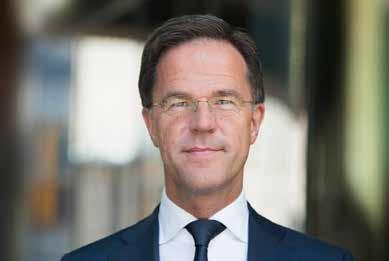
were “affected” by the “intense” reactions people had to their vacation. “We do not want to create any uncertainty about it: In order to get the Covid-19 virus under control, it is necessary that the guidelines are followed. The discussion around our holiday does not contribute to that,” Willem-Alexander and Maxima said. Rutte: “I bear full ministerial responsibility” Later, the RVD issued a clarification saying that Rutte did in fact know about the planned trip. At the time WillemAlexander and his family departed, Rutte was attending the European Council summit in Brussels. In a letter to Parliament on Sunday, Rutte affirmed this, saying that he “realized too late” that trip did not match up with the tightened-up rules in the Netherlands. “I realized too late, especially after the press conference on the evening of Tuesday October 13, that the intended holiday, which was in line with the regulations, could no longer be reconciled with the increasing infections and the stricter measures. This should have prompted me to reconsider the intended holiday,” he wrote. “I bear full ministerial responsibility for the aforementioned.” Normally, he said, travel by the Royal Family when they are not performing a function on behalf of the Netherlands is considered private, but by law the public interest must be taken into account, Rutte wrote. The lockdown press conference on Tuesday garnered 7.4 million broadcast television viewers, and was also available on-demand and on live streaming services. Rutte said he assessed the situation poorly, and that he failed to notify De Jonge of the King’s travel plans. The RVD refused further comment, according to Nu.nl, calling the issue a private matter. The organization said the Royal Family did follow all coronavirus measures promoted by the government. On their last trip to Greece the King and Queen were panned for failing to maintain social distancing guidelines when they posed for photos shoulder-to-shoulder with the owner of a restaurant. In another development has released a statement of apology to the country on his action on behalf of his family.
Although the Dutch partial lockdown includes measures such as wearing face masks in public and selfisolation in the case of illness or travel, the use of masks and quarantine in the Netherlands cannot currently be made compulsory. During a press conference last month, Prime Minister Mark Rutte and health minister Hugo de Jonge said they are working on urgent legal change to make face masks obligatory, and another to fine people who do not stick to 10 days quarantine. So the ‘urgent advice’ to wear face masks and which is now presented by the government on its website as a new rule, is actually not grounded in law. But what the legal issue with making masks compulsory at the moment? Jan Brouwer, a professor of law in society at the University of Groningen and director of research institute the Centrum voor Openbare Orde en Veiligheid,
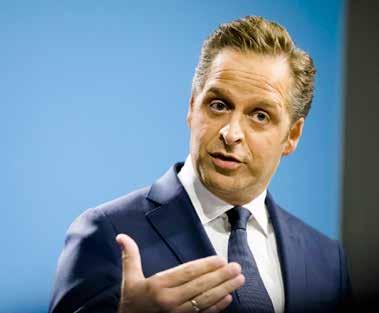
has led criticism of the government’s measures. He told the media that the Dutch constitution guarantees a right to privacy, including what you wear, as well as a right to gather, and these laws cannot be restricted, he said, without an act of parliament. Problem ‘We have a lot of fundamental rights in chapter one of our Dutch constitution, and in a constitutional process in 1983, we decided that there is always a need for an act of parliament in order to restrict fundamental rights,’ he explained. ‘The limitation of fundamental rights is not allowed in emergency municipal 52 www.thevoicenewsmagazine.com

bylaws, and that was the problem in spring.’ Since a Council of State ruling in May found that restrictions could only be applied under emergency laws for a limited period of time, the government has been working on a temporary Covid-19 law. After a huge amount of debate and amendments, this has just passed the lower house and is expected to be voted on in the senate on October 27. Health minister Hugo de
Jonge told MPs he will introduce compulsory face masks as soon as the coronavirus legislation has been passed, and that the legislation includes a specific clause allowing ministers to bring in rules about personal protection
Until the requirement is anchored in law, the cabinet will continue to ‘urgently advise’ everyone over the age of 12 to wear a mask in public buildings. Brouwer, who had called for parliament to break its recess in August to deal with this issue and gave evidence to MPs himself in
September, said that while officials can ask sick people to quarantine for the sake of public health: they just cannot tell healthy people to do this. Healthy ‘As long as we don’t have the temporary Covid law, it isn’t possible to limit fundamental rights except in provisions from the public health law, which allow mayors to put sick people in quarantine or isolation,’ he said. ‘If there was a strong opinion that face masks helped preventing spreading the virus, you could say emergency law on a national scale would create a kind of exception to the rule of an act of parliament being necessary. But the RIVM has always been very ambivalent about the effect of wearing face masks. ‘In order to prescribe the obligatory wearing of face masks, in my opinion there was a need for a new provision: this infringes the right to privacy, described in our constitution for respect for the right of private life,’ he said.
Citizens’ initiative to move colonialist statue in Hoorn scrapped, but included in ‘city talks’
A citizens’ initiative to move the statue of J.P. Coen in Hoorn was scrapped in a city council meeting last month, but the city council agreed to add this initiative to the agenda for previously announced “city talks” about the statue and racism and discrimination in Hoorn. Initiator 23-year-old Gion Raap can live with this, he said to the press. “This way my vision is included, but there is also room for other sounds,” Raap said. “I think it is important that other supporters and opponents can also express their opinion in addition to mine and that is possible with such a city conversation.” In June, the statue of Jan Pieterszoon Coen provoked fierce protests against the background of the Black Lives Matter demonstrations. Demonstrators demanded that the statue be removed, saying that “the butcher of Banda” is wrongly revered as a hero. The Hoorn mayor announced city talks on this topic, promising that they will

happen before the end of the year. Arwin Rood, D66 faction leader in Hoorn, stressed that the city talks must lead to measures and policy. “We must not have a conversation without taking measures. Whether that has to do with the statue or in general with the subject of discrimination. We must follow through on this,” Rood said. GroenLinks was also outspoken about the future of the statue. “The statue must be drastically adjusted or replaced by something else. We will continue to use our democratic resources as long as that statue remains unadjusted. Be happy that people are making use of their right to have a say, appreciate that, those are the expressions we want. If the statue remains, then I think the actions and demonstrations will not stop,” the party said. Jan Pieterszoon Coen, 1587 - 1629, was director-general of the VOC and aimed to strengthen the VOC’s position in the Far East, according to NOS. In 1671 he was appointed governor general. He was best known for his conquest of Jakarta, which was later renamed Batavia. It is now called Jakarta again. Coen was well known for the violence he used. According to NOS, his greatest crime was the punitive expedition to one of the Banda Islands. He had thousands of residents of the island murdered after they delivered nutmeg to the English against agreements with the VOC
Green party wants to give 18-yearolds a ‘starting capital’ of €10,000
One of the plans in GroenLinks’ election program is for the government to give young people a “starting capital” of 10 thousand euros when they turn 18. They can use this money for their own development, for example to pay tuition fees, start their own business, or retrain for a more promising labor market sector, according to Dutch media report. The green party is worried about the inequality in opportunities between people in the Netherlands, and think this starting capital can help in decreasing that inequality. “Where you were born determines your opportunities in life and poverty is passed on from generation to generation,” the party said. According to the party, this plan will cost about 2.2 billion euros per year. GroenLinks wants to pay for it through a “solidarity contribution” by millionaires. People with more than a million euros in wealth will have to annually pay 1 percent of their assets above that amount to the government. Those with two million euros or more have to pay 2 percent on their assets over 2 million euros. Property values will not be considered as part of your wealth. The GroenLinks election program for the 2021 parliamentary elections, which will officially be presented on Saturday, also replaces the current student loan system with a “new scholarship” in which students receive a maximum of 400 euros per month. All students who took out loans in the past five years must also receive 10 thousand euros in compensation. “This is to ensure that the generation that has been disadvantaged by the loan system gets a bit in return.” The PvdA also believes that the loan system generation should receive compensation, but will only elaborate on that when presenting its election program at the end of the month. The D66 wants to reduce student debt by giving students with study loans retroactive grants. The party wants to spend between 3 billion and 8 billion euros on this project.

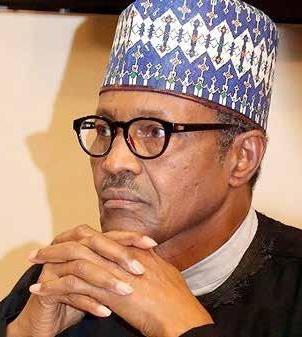
Global voice to end Sars brutality in Nigeria has gained international recognition and attention and right now many countries around the world are joining Nigerians to protest even on their streets while the event is millions of miles away from them. Just as they mobilize people and resources to support the Black lives Movement, EndSars brutality is gaining momentum however the Nigerian government handling of the protests is not the best so far. Of course the Nigerian government never expected a more aggressive protest and agitation like this. In the past after 2 or 3 days of intimidation and harassment by the same Police force, the protesters quietly withdraw from the streets and everything dies down but this time
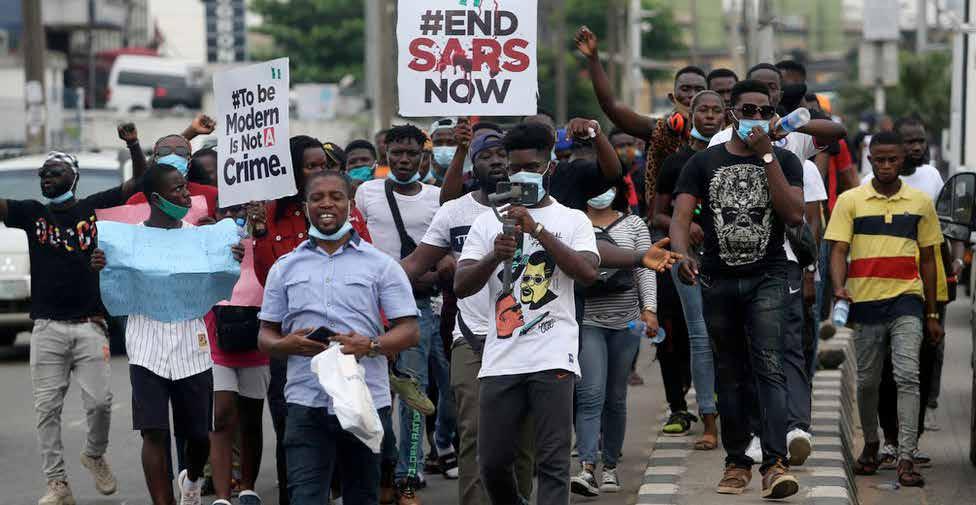
around, the protest has grower bigger and stronger that the government is weighing its options. To use military force, impose curfew in various states of the country- that would be tantamount to
shutting down the economy of the country which is already on its knees. To dialogue with the protesters seem not to be working. Why? No clear leadership of the protest to speak to, those who claim to lead the protest has been discredited. You cannot dialogue with a man or woman who thinks he or she has nothing to lose or gain after all, Nigeria
youths have been short changed, pushed to the wall, the only option left for them is to fight back even at the cost of their lives. As we write this report, some had already been killed in various circumstances during the protest. We are not talking of hoodlums or thugs trying to take advantage of the situation to steal, rob and destroy private or government properties. To manage a protest of this magnitude and nature which does not have a clear cut leadership structure or control means that hooligans, thugs and other destructive elements would try to hijack the protest and cause more chaos. That is already been witnessed in parts of the country, Edo State, Lagos State, Osun State and Abuja has witnessed this type of activities, in particular Edo State, it has witnessed the prison breaks, burning down of a police station and stealing of fire arms. Now we have official fire arms in the hands of criminal gangs, there would be no sleep for a while for the residents of Edo State and environs. Again there are calls by some to destroy assumed government properties. At the Voice News magazine, we do not support these acts of violence against the same country we want it to be restructured. Those properties do not belong to President Buhari or his party, APC. They are Nigerians property built by our collective money so if you destroy them, you are destroying yourself please. Our appeal is that do not destroy yourself because you may not have a country called your own again. “If we burn down our schools because they were built by the oppressive minority rule of the whites in South Africa then we don’t have any form of education and we would remain in our ignorance, we would have no form of education. Let them teach us their lies and with that knowledge we can demand for our freedom”. These were the words of late Dr. Nelson Mandela as he appealed to the youths with black population majority in South Africa under the Apartheid regime to stop burning down the schools. If they have not listened they would have remained in perpetual ignorance even till today. There is an adage in my language that even when we cry; we see where we are going. We cannot afford to ruin the gains of the protests by emotions not controlled. Those on the government side should as well guide their statements and utterances like the Spokespersons for Mr. President Shehu Garba and Mr. Femi Adesina and of course the Minister of Information, Lai Muhammed. Mr. Adesina while answering questions on the protest on National television called it a pocket of people and he calls it ‘funny’. He repeated it more than twice even asking the interviewer to quote him. Same goes for Shehu Garba and I know the nature of their job description to defend and protect the interest of the President. The same for the Minister of Information, Lai Mohammed but in a national crisis like this, they should allow the President to speak to the people himself except they are telling the public, what they are saying is a representation of what the President would say to the people after all they write his script for him. They shouldn’t forget that they currently live in a glass house protected by public funds and after 8 years if the romance last that long, they would join others as ordinary citizens not protected by the power and authority of the corridor of government. They would live among the same people Mr. Adesina describes as ‘funny people’. No man enjoys the cover of state power forever even the worst dictatorships. They should look at history and those who occupied that position before them. We are not surprised that his words are that of whom he represents. The President sees Nigerian youths are funny. No wonder the President has not been able to address the issues raised by the youths, these people he entrust to write his script are calling Nigerian youths ‘ funny and jokers’. Well using force as they have suggested will not be a solution except they want to kill over 30 million of Nigerian population. Are they capable

of doing that? Yes we guess since they said they would not be blackmail into dialogue to restructure. In fact right now dialogue may also not be possible to accomplish this mission so what is the way forward? The President who spoke at 60th diamond celebration should readdress the nation and this time, he should kindly listen to voices of wisdom before he speaks. One thing that is urgent is to dissolve his present cabinet as a stepping-stone. Secondly he should take concrete actions on the reforms put forward to him by the youths of Nigeria. Thirdly, he should ask his State Governors to dissolve their cabinets as well so they can appoint new ones with departure from the old fashion way of compensating old political friends. Fourthly, revisit the issue of restructuring of Nigeria through constitutional means, efforts where put into trying to give Nigeria a new constitution, 1979 constitution is outdated and too many faults in it. Finally the government should stop using force to quench protest. It does not work rather the anger and frustration increases. Hopefully reason will prevail in the situation of Nigeria.
QUAYSON K Successful book launch in Amsterdam
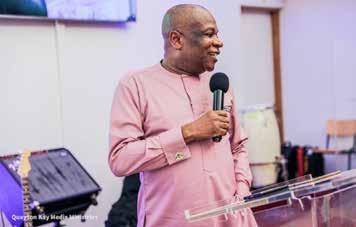
The much anticipated book launch of Rev. Quayson K took place at the Charity’s House (Bijlmerdreef 1239, 1103 TX Amsterdam last month and the book was well received with massive attendance despite the corona crisis in the country. There’s A Curse In This House: Who Brought It? The book was reviewed by Dr. Mrs. Joan Vondee Awotwi (PhD). The moderator was a lecturer at the university of Amsterdam, Rev. Dr. Nelson Kwaku Boateng Frimpong who happened to be a lecturer to Rev. Kwabena Quayson. He narrated how he took Rev. K as a son and eventually encouraged him to go back to school at his old age. Dr. Harrison Kwabena Frimpong who in

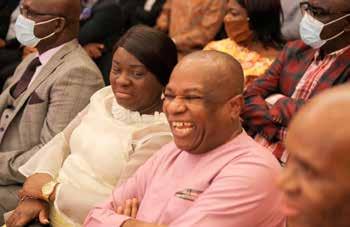
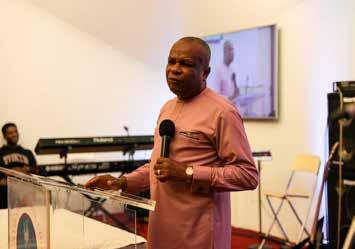
the midst of the Apostles and the Pastors, used God sending His Son to the world as a gift to launch the book with lots of humour causing the whole audience into laughter. Quote: “When I ask ‘there is a curse in this house, who brought it?’ I am drawing your attention to that peculiar thing in the house that has become common that everybody goes through or it affects everyone. I am talking about The Family Tree! How does your family tree look like! I mean the person up the family tree who was the cause of a curse that has become generational- the originator” The much attended program was graced by renowned Ministers of God from Amsterdam and beyond. Apostle Livingstone Kofi Tsagli of Resurrection Power and Living Bread Ministries Int. Rev. Emmanuel Waterburg of Pentecost Revival Church Rev. John Owusu Agyeman of Holy Ghost Revival Chapel Rev. Fred Nyarko Apostle Larry Dorkenoo Apostle Ofori Amanfor Rev. Nana Baiden Pastor John Olsen Pastor Sammy Boafo Pastor Kofi Crentsil Pastor William Boateng Evangelist Jolly Pastor Kusi Boasiako Apostle Tony from Belgium Pastor Solomon Tetteh - Quaye Pastor Kingsley Baafour from Belgium Rev. Seth Bempon of Acts Revival (Den Haag) and many more... Also in attendance were Nana Nsuobeyebouden Owusu Boateng Agyenim, Dr. Adu - Acheampong (PhD) Mr. David Agyekumhene Mr. S.O. Asante of Recogin and a cross section of the entire community. Music was performed by: John Angoh, Minister Dennis de Almeida, Aaron and Betty Baiden. Rev K is using this medium to thank each and every one who participate and continue to patronize his book. He prays that the book becomes a blessing to your lives Signed: Rev. Kwabena Quayson
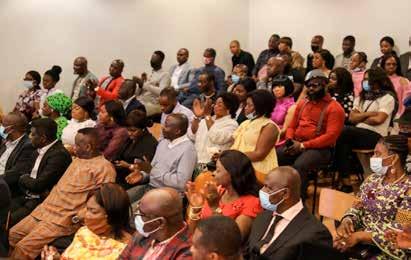
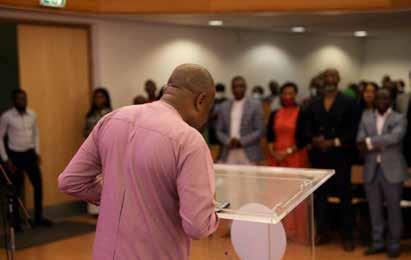
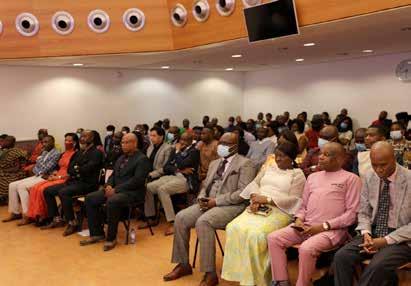
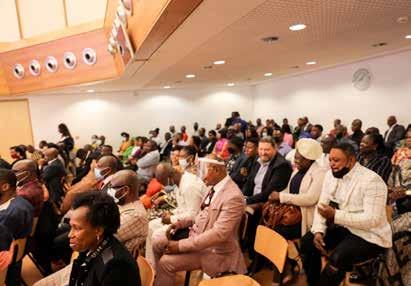
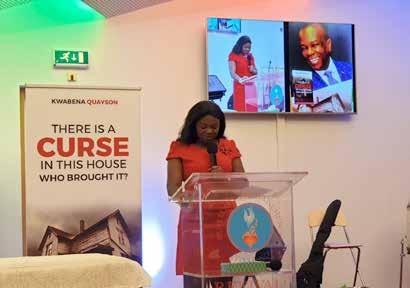
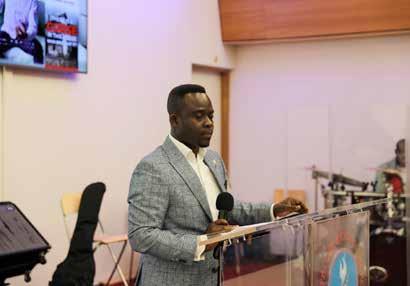
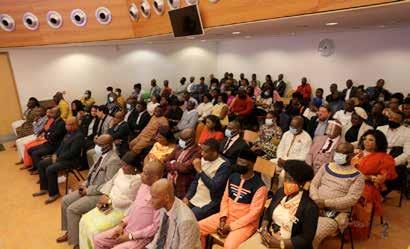
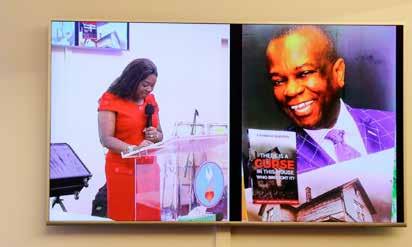
Meet 22-year-old Christine Mutesi, Rwanda’s most outstanding teacher
By Edwin Ashimwe & Gad Nshimiyimana
It is a few minutes past 1 pm, as we are cleared to access Groupe Scolaire Nyaruguru, located in Kinazi village in Ruhango District. In the school compound, we are welcomed by Christine
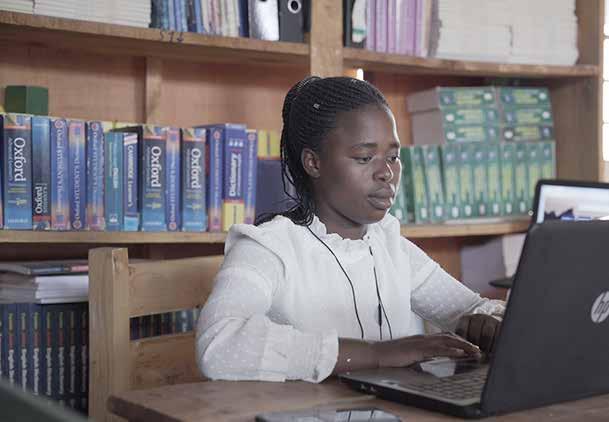
Mutesi, the primary four Elementary Science and Technology (E.S.T) teacher, who guides us to the school library for what turned out to be an insightful conversation. Clad in a black skirt and a white top, Mutesi made national news last week on October 5, when she became Rwanda’s youngest teacher to ever win the most outstanding award on the country level. Alongside the certificate of recognition, she was also given a tablet, a brand new motorcycle and a cow. She was awarded on the same day the country joined the rest of the world to celebrate International Teachers Day. An event that was held virtually due to the Covid-19 pandemic. Every year, best performing teachers are awarded as part of efforts to celebrate and honor their work.
To get the winners, teachers compete based on given criteria set by the Rwanda Education Board (REB). In particular, this year’s competition was ‘tougher’ because teachers were required to indicate what they did to facilitate home-schooling for their students as schools remained closed due to Covid-19. “I had never participated in such a competition. But when I heard about the criteria for choosing the best teacher, I felt there was a chance for me,” she said. Teaching in the face of a pandemic When the first Covid-19 case was reported in the country in March, all in-person class sessions were put on a halt in order to curb the spread of the virus.
“Seeing that I had been physically disconnected from my students, I had to do something that would help me connect with them again,” said Mutesi, who was cheerful throughout the interview.
Particularly, she added, “When schools closed, I could imagine how young students were surviving even when it appeared to be hard for us the teachers”.
Based on this, Mutesi established an online platform that would help primary school students learn as well as assess themselves.
She knew not all her students were connected, so she opened up the platform to all children in the country. “I created a platform where I would share notes every week on Facebook and WhatsApp. For every notes, I would also send a quiz which would help the student evaluate themselves,” said Mutesi, adding, “The application has an automatic marking feature where the student can see their marks immediately after submitting the test”. Going by the attendance of students, she says that the

platform was a timely initiative, citing that at least 80 students could participate every week. Similarly, in a bid to support students who didn’t have access to digital tools, Mutesi initiated a rabbit-keeping programme among her students. “I started with four rabbits and gave them to four students on grounds that if it litters, the owner would share kittens with a neighbour who didn’t have one”. According to Mutesi, her students have been spending more time looking after the rabbits as opposed to wasting that time on unnecessary – and at times harmful - activities especially during the pandemic. “I tell them that they are not supposed to be loitering around, but rather looking after the rabbits so that when schools reopen, the best rabbit keeper will be awarded.” So far, the project had at least led to a chain of 65 rabbits in her village. Edutainment approach People who know Mutesi, told this publication that her work is characterized by an entertaining teaching approach. “There is a special joy to be found in watching her go about her work,” said Jean Bosco Nsanzimana, head teacher of GS Nyarugenge. Nsanzimana who describes Mutesi as a youthful charming and talented teacher, also highlighted that while in class, she shows a high level of connection with her students. “She is very energetic and at the same time disciplined. On top of that, she gives much of her time to students. As a school we are very proud of her,” Nsanzimana reiterated. According to Mutesi, an entertaining approach enables her students to relate easier to the subject regardless of how complex it might seem. “There are many things you can do. Normally when I enter my class, especially on Mondays, my students expect a new joke or play”, and “like I told you, even my age and size makes it easy for me. If it is a new play, I join them and we act together, if it is a song, sing along with them”. Such moments, Mutesi pointed out, make the lesson easier for a young student. “It helps them remember the lesson but also it makes them feel happy. When they see a teacher dancing in front of them they are surprised and happy at the same time”. With passion the sky is the limit According to Mutesi, professional teachers must pick interest in the career before joining in order to excel. “What I can tell them is to come to this profession with passion. They should pick interest before joining. And I can testify that once you are passionate, this is one of the best professions.”
In contrast, Mutesi understands that when a teacher comes looking for money, they start comparing themselves with other professions which later affects their attitude towards work.
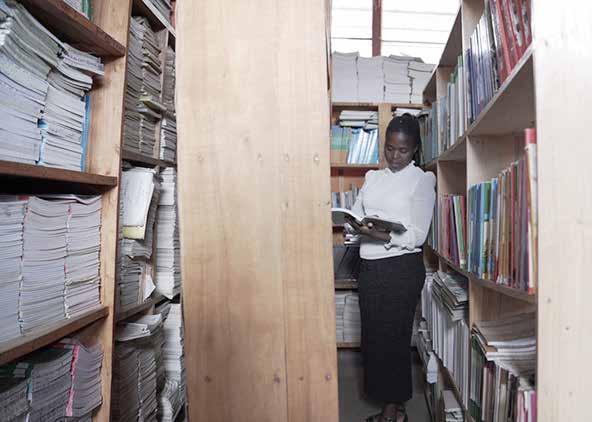
“It is true that we are among the least paid professionals. Personally, I get paid and sometimes I don’t have what to save”, she added, “This is even more challenging with those teachers who have families to look after.”
According to her, there is no salary that is worth a teacher’s service.
“I don’t think if we tabled the bill, anyone can be able to pay us. If I wake up at 5:00 am in the morning, walk to school where I spend more than 10 hours every day, I don’t think anyone can ever pay that bill”. In that regard, she highlighted, “My message to teachers especially those who are fresh as well as those who are aspiring to join the field, is to know that they are educating the generation of the future”. “When you are most interested in the service other than the money, it makes your life easier. It makes you fresh every day. You will not see a teacher ageing. You will always feel young because of the environment” Mutesi reiterated.
Going forward, Mutesi, who is a second year student at the University of Rwanda’s College of Education, told this publication that she aims at staying in the education sector. “I might not be working as a teacher necessarily but I want to remain in this sector. I think I will apply for a different job but which has something to do with education”
The World Has Lost Patience With Zimbabwe’s ‘Crocodile’
President Mnangagwa will only get help if he gets serious about economic and political reforms writes Bobby Ghosh.
Over year ago this month, Zimbabwean President Emmerson Mnangagwa strained credulity when he declared in a Television interview, “We have rejoined the family of nations.” The international community was already losing patience with his inability to deliver economic reforms, and Zimbabweans were complaining of a steady erosion of the political freedoms that had come with the 2017 military-led ouster of the dictator Robert Mugabe. Indeed, in some respects the new president, who revelled in the nom de guerre “the Crocodile,” was proving worse than his former boss. The flickering hopes for a new Zimbabwe have now been extinguished. Mnangagwa, cracking down on dissent at home and waving off criticism from abroad, is practically indistinguishable from Mugabe. And the “family of nations” is letting its dissatisfaction be known. In an unusually blunt joint statement last week, the governments of the U.S., Britain and five other European nations, said Mnangagwa’s administration was using the coronavirus pandemic as an excuse to restrict citizens’ freedoms. It was neglecting corruption and failing to prosecute those responsible for human-rights violations. “The Zimbabwean people have the right to engage in dialogue to build a better future for their country,” the statement said. “But the necessary discussions have so far been hindered by unhelpful rhetoric and blame assigned to several groups.” The statement came days after the arrests of the investigative journalist Hopewell Chin’ono and opposition politician Jacob Ngarivhume, ahead of planned anti-corruption protests. They were accused of “incitement to participate in public violence.” The U.S. embassy in Harare tweeted that the government was prosecuting Chin’ono and other activists “instead of the culprits” responsible for the corruption. The Mnangagwa administration has accused U.S. Ambassador Brian Nichols of “casting aspersions on the Zimbabwe government and dabbling in local politics.” It’s a far cry from last fall when the president asserted on Bloomberg TV that relations were the best they’d been in decades. It isn’t just Western nations that are raising red flags about the deterioration in Zimbabwe. Neighboring South Africa has expressed alarm at reports of human-rights violations. President Cyril Ramaphosa sent special envoys to Harare last month, offering to help Mnangagwa address his challenges. They were told there was nothing to discuss, and that they

had no business interfering in Zimbabwean politics. But even as Mnangagwa tries to keep the world at bay, Zimbabwe’s economy desperately needs an international intervention. Food and fuel scarcities are chronic, and power and water shortages have worsened. Last year’s drought, the worst in a generation, left deep scars. The Zimbabwean dollar, reintroduced last summer after a 10-year hiatus, is in serious trouble. In another echo of the Mugabe era, annual inflation in Zimbabwe accelerated to 837.53% in July. The Crocodile, meanwhile, has talked up $27 billion in planned investments, in everything from platinum mines, steel mills and hydropower dams to abattoirs. The government has proposed to issue a 30-year bond in international markets to raise $3.5 billion to compensate White farmers evicted from their land by Mugabe two decades ago. But these are pipe dreams. Foreign investors and lenders are not buying Mnangagwa’s claim that “Zimbabwe is open for business.” The country has defaulted on its loans since 1991, and currently owes nearly $8 billion to financial institutions, including the World Bank and the African Development Bank.
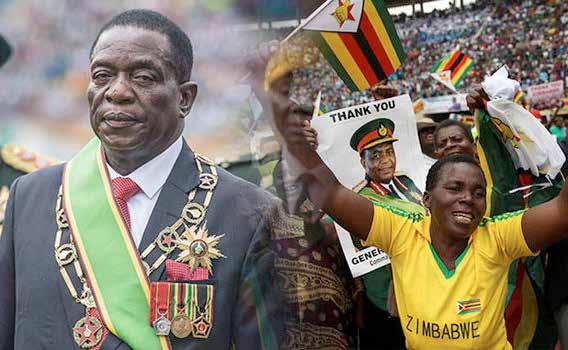
Finance Minister Mthuli Ncube’s pleas for debt relief have been rebuffed by multilateral lenders. The Paris Club, which includes several creditor nations and is owed $3.26 billion, said Zimbabwe must first improve its human-rights record and pay outstanding arrears. Without international support, Zimbabwe’s top treasury official has warned, there is little hope of reviving the economy and containing inflation. But Harare is in such a bad spot that Zimbabwe has even been denied a share of the $50 billion pot that the International Monetary Fund made available to help low-income and emerging economies soften the economic blow of the coronavirus pandemic. Ncube has been able to raise just $200 million from donors and governments. But Mnangagwa is unwilling to undertake the political reforms necessary to secure assistance from the international community. He has shown little appetite for taking on those who benefit most from the institutionalized corruption of the Mugabe years — including his political allies and the military leadership that helped him secure the presidency. He remains in fear of being toppled, as his predecessor was, in a military coup. His deputy, Constantino Chiwenga, is the former chief of the armed forces. The Crocodile had been hoping the “family of nations” would fatten the proverbial calf for the returning prodigal. But the family has made its terms clear. Mnangagwa cannot sit at the table before first cleaning his hands.
To contact the author of this story: Bobby Ghosh at aghosh73@bloomberg.net
MTN Rwanda moves to curb mobile money fraud
By Edwin Ashimwe
Telecommunication operator MTN Rwanda will effective Thursday, September 24, roll out a new cash withdrawal process, an initiative that aims at curtailing the growing number of mobile money fraudsters. According to Teta Mpyisi, the Brand and Sponsorship Senior Manager at MTN Rwanda, “All mobile money customers will have to pre-authorize any withdrawal request by dialing *182*7# before an agent can send a withdrawal prompt message”. The value of funds transferred via Mobile Money grew by

450 per cent between January and April this year to reach Rwf 40 billion (over $ $42 million), data from Rwanda Utilities Regulation Authority shows. Besides, the increased uptake and adoption of Mobile Money across the country, operations by fraudsters to take advantage of unsuspecting clients have been on the rise and point towards customer vulnerability. For instance, latest figures released mid-June this year by Rwanda Investigation Bureau indicate that the body received about 80 cases of people whose money was stolen from mobile phones. In these schemes, close to Rwf12 million was stolen. In an earlier interview, John Rwangombwa, Central Bank Governor told The New Times that in just two months of the lockdown digital payments increased more than five times. “Mobile money transactions have bank accounts that show the float — the amount of electronic money being transacted within the population. Before the Covid-19 outbreak, this float was Rwf28 billion and by mid-May, it had grown to Rwf60 billion.” Following the spike, officials warned that there was urgent action towards raising public awareness on cyber safety and security, especially targeting mobile money wallets which more than half of Rwandans own. In this regard, Mpyisi said that the new process is a security enforcement feature to the ordinary way of withdrawing money. “This is to ensure that the MoMo platform remains safe and secured while protecting our customers from fraudsters who want to take advantage of them”. Additionally, we require customers to be diligent when approving transactions.
By HOMEF
There are several pointers to the fact that COVID-19 and similar disease outbreaks are as a result of our encroachment on natural habitats and destruction of genetic diversity occasioned by the industrial system of agriculture and other economic activities. The current pandemic and the lockdown measures to curb its spread have given us an opportunity to analyze our food production systems and to change our course for a healthy and resilient future.
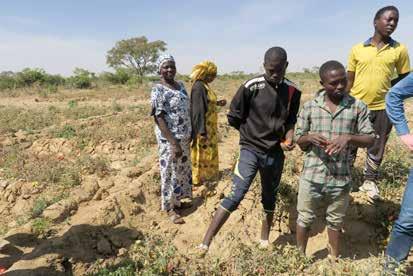
The pandemic has brought to fore the importance of local, inclusive and sustain-able food systems because while many businesses are shut down and commercial processes including the distribution of genetically modified seeds to farmers are restricted, small holder farmers have to keep up with the production and marketing of healthy food for the population. This, they do in spite of the challenges they face in terms of restriction of movement; access to markets, credit schemes; lack of storage and processing facilities; and poor road networks etc. On 30 June 2020, HOMEF had a webinar (Dialogue) with students of Agriculture and youths from across Nigeria which focused on the implications of the pandemic on our food systems; the impact of industrial agriculture (GMOs, excessive use of chemicals, monocultures etc.) On food systems as well as its link to pandemics such as the COVID19; and issues of seeds and markets and how they affect small holder farmers. The dialogue which also had journalists and CSOs in attendance highlighted the way forward for healthy and resilient food and farming systems in a post COVID-19 Era. Speakers, drawn from Nigeria, Ethiopia and South Africa included Million Belay, Coordinator of the Alliance for Food Sovereignty in Africa; Tatfeng Mirabeau, professor of Medical Microbiology, Nigeria Delta University;
Jackie Ikeotuonye, CEO at Bio-integrity and Natural
Foods Awareness Initiative; and Linzi Lewis, a researcher and advocacy officer at the African Center for Biodiversity. The fact that we must first understand the root of problems before we are able to solve them was stressed by Nnimmo Bassey (HOMEF Director) in his opening remarks. “Industrial agriculture (which propels 80 percent of deforestation, promotes land grabs, displaces family farmers and communities) and the pursuit of profit have unrelentingly eaten away at natural habitats, bringing about displacement of both humans and beasts” he explained. According to Million Belay, intensive livestock production and destruction of genetic diversity occasioned by modern biotechnology further increases the risk of emergence and spread of diseases such as the COVID-19, SARS, Ebola, etc. Speaking on the realities of the present pandemic, he stated that it has brought about increased marginalization of already marginalized people. “Women are seriously impacted as they have the responsibility of caring for the sick and also making food available amidst the movement restrictions and market challenges” he added. Speaking further on the impacts of the pandemic on our food and farming systems, Jackie Ikeotuonye stated that there have been hikes in food prices, poor access to seeds by farmers, poor access to markets, disruptions in collecting and transporting agricultural products to areas of consumption, post-harvest losses occasioned by lack of storage facilities, and a general inability of farmers to meet up with food supply. “This is the time to explore sustainable agricultural systems which provide healthy, enjoyable diets for all while contributing to socioeconomic development and minimizing (and eventually eliminating) environmental impacts and waste. Agroecology and food sovereignty are of key importance in the post COVID 19 era. The right to own and control our agricultural systems and our food from seed to consumption must be upheld” she explained. Speaking on seeds, seed laws and markets, Linzi Lewis stressed on the importance and need to protect farmer managed seed systems which provide 90% of agricultural seeds and which allows for saving, sharing and sale of local, genetically diverse, adaptable and affordable seeds across planting seasons. It was noted that currently, the orientation of our seed laws is specifically towards the private sector which undermine the farmer managed systems that we rely on. We must understand that it is the small holder farmers who feed Africa and so we are faced with the question of who will
feed us since our laws put the small holder farmers at risk and favour the private sector whose major concern is export and profit. Genetic modification of food crops and specifically the approval for commercial release of Bt Cotton and cowpea in Nigeria is of serious concern. “Implication of GMOs, in addition to the loss of farmers’ rights over the modified seeds include increased use of herbicides – destruction of non- target organisms; loss of biodiversity; and health implications such as cancers, immune system disorders, birth defects etc.” Professor Mirabeau
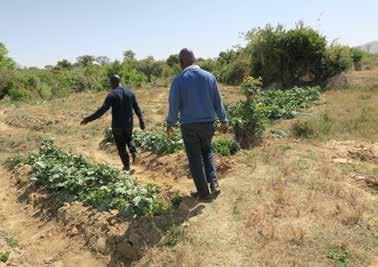
explained. It was stated that landmark outcomes such as the reportAgriculture at a Crossroads issued by the International Assessment of Agricultural Knowledge, Science and Technology for Development (IAASTD) in 2008 which calls for adoption of the most efficient farming systems, and recommends a fundamental shift toward agroecology as a way to boost food production should be utilized in national policy. In addition to being an efficient and resilient farming system, agroecology, according to the United Nations Food and Agriculture Organization in 2014 is a key element of the food system that the world needs in order to achieve the Sustainable Development Goals (SDGs). As noted by the FAO, Agroecology directly contributes to many of the SDGs including eradication of poverty (1) and hunger (2), ensuring quality education (4), achieving gender equality (5), increasing water-use efficiency (6), promoting decent jobs (8), ensuring sustainable consumption and production (12), building climate resilience (13), securing sustainable use of marine resources (14) and halting the loss of biodiversity (15). From the presentations and discussions, the following action points and recommendations were drawn: • While the immediate concerns of protecting the health of citizens may be taking precedence during the crisis, our governments need to keep their foot on the pedal of agricultural transformation and take this opportunity to strategically rethink our agriculture and food systems. • We should focus on regenerative, restorative agriculture such as Agroecology that nourishes and sustains ecosystems and biodiversity. • Post COVID -19, we must wean ourselves from the dependency on imported processed foods and on the industrial agricultural system which not only impact negatively on our health but also weakens our economy. A mindset of autonomy and strong political will is needed to turn the enormous potential of Africa’s food sovereignty into a reality. • The government should put in place a variety of proactive measures to mitigate the impact of the pandemic on women, small holder farmers and producers. • Young people should be included in dialogues with public health specialists and policymakers and should be given the opportunity to contribute to decision making and problem solving. Including young people will result in a more sustainable and long-term solution to the current and future pandemics. The youth of today can act as custodians of the pandemic response in order to remind future generations of the lessons learnt, pitfalls, and the best way forward. • Our governments need to be proactive in monitoring food availability and pricing. This can be done by setting up foodsecurity or agricultural response units in the face of COVID-19 as centralized strategic and planning hubs. Governments should deploy digital tools and data-gathering approaches to manage food availability, accessibility, and affordability—as well as providing support to value-chain players. Africa is rich in biodiversity and we have the potential to feed ourselves and have excess to share with the global human community. We do not need the external approval of exploitative
entities to build a sustainable food and agricultural system. We must resist the urge to have our food system guided by the warped agenda that promotes mass production driven only by higher profit margins and that see food only for its market value. The pandemic is also forcing nations to recognize the risks of depending on other nations for major food and health supplies. This presents us a pivotal moment to direct the future that we want.
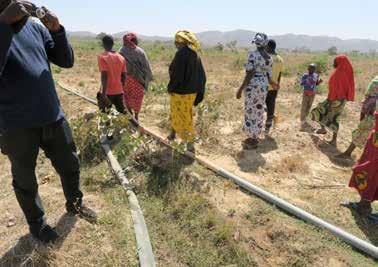
Concerned Nigerians started this petition to Nigerian government and we recognize that this moment is the culmination of decades of dissatisfaction over the decay and corruption of our dear country, Nigeria.
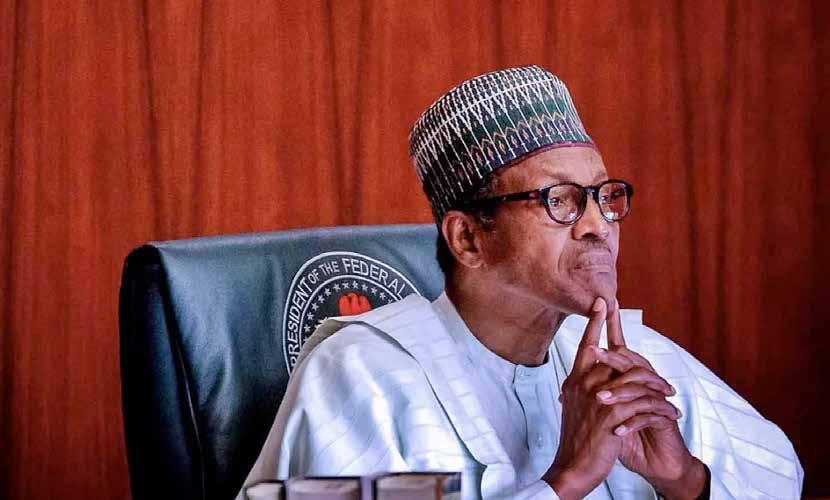
We find the unhealthy haste to fashion a unit termed “SWAT” to be a misrepresentation of the 5 for 5 demand. It is not enough.
This protest is beyond #EndSARS, #EndSWAT, #EndPoliceBrutality. This movement is for the soul of Nigeria. We are demanding a systemic overhaul of governance and institutional reforms as the barest minimum. We are better than what obtains presently; we demand progress. We are not vain agitators. We are clear-eyed youths and professionals in our respective fields who are tired of the way and manner our dear country has been run aground by successive administrations. We cannot idly stand by whilst our future and that of our children are mortgaged.
Below is the updated 7-point demand that concerned citizens are asking from the government. 1. INSTITUTIONAL REFORMS (SECURITY) That the 5-point demand to release arrested protesters, compensate families of victims, investigate and prosecute all reports of misconduct, proscribe SARS and review the welfare of police be implemented immediately.
However, we believe the systemic rot in the police is widespread across Government institutions. Therefore, we urgently demand an immediate Institutional reform across all federal government institutions, agencies and parastatals, especially focused on national security. Focus will be on improved welfare and terms of service for the police, military and all law enforcement agencies, provide body worn cameras for operation, refurbished housing, health, academic and pre- and post-retirement life insurance policy for the rank-and-file personnel. Also reforms on adherence to the laws guiding discipline and prosecution of erring service men this should be aimed at extinguishing all notions of impunity.
2) COST OF GOVERNANCE We have watched over the years the waste associated with governing Nigeria. We have noted the duplication and
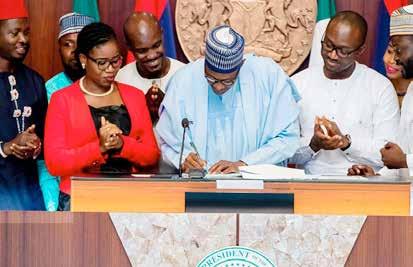
unprofessionalism in the civil service and across all strata. We demand an urgent budgetary framework with 50% capital expenditure and 50% recurrent expenditure in all appropriation bill. We demand a drastic reduction in the cost of governance. We also demand that the national assembly, be first by streamlined into a unicameral legislative and be further stripped down to become a part time job.
The huge salaries and benefits accorded them by the Revenue Mobilization, Allocation and Fiscal Commission (RMAFC) should be reduced to the barest minimum.
3) CONSTITUTION REFORMS There had been several constitutional reviews where youths were obviously absent. Whether by omission or commission or both, the time has come for an informed and progressive participation by the youths. The Nigerian constitution as it exists presently does not serve all Nigerians. A more robust and engaged constitution designed and approved by all Nigerians will serve the nation. We demand an urgent referendum within 90 days to begin the line-by-line review, reconstruction and upgrade of the extant constitution to be more functional for a 21st Century nation. The selection process for this referendum will have 50% young people under 60 nominated by their peers in a transparent, judicious and fair process.
We demand that credence be given to terms of citizenship over indigeneship and state of residence over state of origin.
4) EDUCATION REFORMS · One in every five of the world’s out-of-school children is a Nigerian child. About 13.2 million Nigerian children aged 5-14 years are not in school. The impact of this numbers will be felt for generations. · We demand that a state of emergency is declared in the education sector and demand increase in the budgetary allocation to educational sector by 50% and to double again within the next 24 months. This funds will be used to drive the education sector to provide affordable quality education to all citizens. · A certain percentage of this allocation should be devoted to granting scholarship to outstanding Nigerians without recourse to the tribe, religious or sex.
· We demand a systemic overhaul in our curriculum and method of teaching to upgrade to a digital experience.
· We demand that teachers should be incentivized to attract the best brains and should be standardized and professionalized.
· We demand that the parent of any child not in primary school will be prosecuted to the full extent of the law.
· We demand that there be an Annual independent external Audit of Fund allocation and project execution: from Government approval to disbursement across the ministry, which would further be used to publish at least an abridged Financial statement available digitally to ensure transparency.
5) HEALTH REFORMS · We demand that a state of emergency is declared in the health sector and demand increase in the budgetary allocation to health sector by 50%
· We demand mandatory health insurance for the vulnerable population in our society as NHIS is not doing enough to serve all Nigerians.
· We demand that adequate provision be put in place to

protect the rights and privileges of physically challenged citizens in Nigeria.
· We demand urgent attention to mental health and a fund to set aside to create more professionals.
· We demand proper implementation of the National Health Act of 2014, including the Basic Health Care Provision Fund).
· We demand that there be an Annual independent external Audit of Fund allocation and project execution: from Government approval to disbursement across the ministry, which would further be used to publish at least an abridged Financial statement available digitally to ensure transparency.
6) YOUTH AFFAIRS REFORM We have noted the giant strides made by Gen Z and Millennials across the globe. Many multi-billion corporations where founded by both generations. In Nigeria, it is extremely difficult for such to occur. The enabling environment viz-a-viz investors and lenders confidence, stable interest rate and manageable inflation are deficit in our dear nation. · We demand that a state of emergency be declared in the ministry of Youths and Sports, Ministry of Science and Technology and Ministry of National Planning. We demand that this should be adequately funded, sports academy should be revamped. · We demand the creation of the Youth development funds dedicated to growing the creative industries and agriculture.
· We demand that the Not-Too-Young to run bill should be expanded to include–50% inclusion of youth under 40 in every cabinet in government.
· We demand that the youth inclusion be monitored by the FCC as they currently monitor state inclusion and the NCDMB and other stakeholders partake in this action to protect our future.

7) PUBLIC OFFICE REFORMS
· We demand code of conduct reforms for all elected public office holders to have themselves and their children use public schools and public hospitals ONLY. Violation of which is immediate impeachment and recall.
· We demand immediate removal of immunity clause from public office holders to make them answerable to investigations at all times when and where necessary.
· We demand immediate resignation of every public officer found guilty of any forms of crimes and corruption step aside during investigation also.
· Implementation of full digitization of the judicial process, prison decongestion reforms, with reforms drawn from past projects like the Uwais Report, Keyamo’s ministerial screening address, strict time limits to determination of industries litigations, etc. Are these too much to ask from a government elected to take care of the populace? Nothing more or less would satisfy the Nigerian Youths. Enough is Enough.
A cross section of Nigerian youths living in The Netherlands took to the streets of The Hague where Nigerian Embassy is located to register their protest against police brutality in Nigeria in what has globally become known as “EndSars”. It was a peaceful protest in front of the Nigerian Embassy where members of staff came out to listen to the protesters. The Embassy was led by one of the senior Ministers, Mr. Kabiru Musa who represented the Ambassador. He carefully listened to each of the protester and after which he spoke to them; he appreciated their orderly manner and conduct and assured the Nigerian youths that their petition would be delivered to the appropriate authority in Nigeria. The event was covered by Africa Webtv and copyrights of photos published are courtesy of Africa Webtv

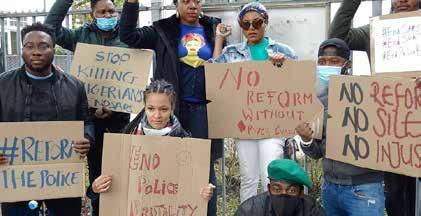


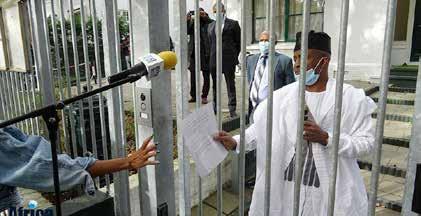

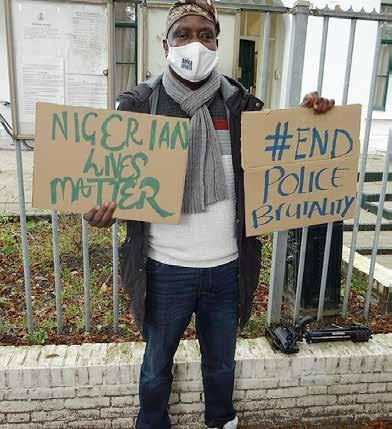
Boxing champion, Joshua & Man United’s Odion Ighalo Voices Support for Nigerian Protesters
Heavyweight boxing champion Anthony Joshua voiced support for Nigerian protesters and Manchester United striker Odion Ighalo said he’s “ashamed” of his country’s government after reports that anti-police demonstrators were fired upon in Lagos. The shootings last month caused an unknown number of deaths and injuries, and sparked global outrage. Protesters stayed on the streets breaking the government curfew. “The situation has escalated since then, the violence and killings are horrendous,” Joshua wrote on Twitter. “All because of people saying they want to live in peace?” “Change will happen! It’s time,” he said. There were reports of gunfire across Lagos. Demonstrations and gunfire were also reported in several other Nigerian cities, including the capital city, Abuja. As at the time of our report, the majority of the protest has given way to mass looting and destruction of properties both government and private properties. It is developing into anarchy where there is total breakdown of laws and orders. Victor Osimhen, who plays for Napoli FC in Italy, sent a supportive message via a shirt inscription, displayed after scoring a goal in their last football match. The inscription reads,

“EndPoliceBrutality in Nigeria.” Striker Ighalo of Manchester United recorded a video message after United’s 2-1 win over Paris Saint-Germain in the Champions League. The 31-year-old former Nigeria international spoke from the field at Parc des Princes in Paris where he declared that he is ashamed of his country’s government allowing the use of excessive force on peaceful protesters. No one is sure if these influential players may call for boycott of the National teams of Nigeria.

